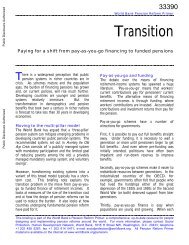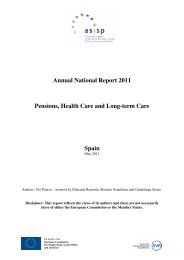Financial Sector Development in Africa: Opportunities ... - World Bank
Financial Sector Development in Africa: Opportunities ... - World Bank
Financial Sector Development in Africa: Opportunities ... - World Bank
You also want an ePaper? Increase the reach of your titles
YUMPU automatically turns print PDFs into web optimized ePapers that Google loves.
206 Dafe<br />
Alternative Approaches to Expla<strong>in</strong><strong>in</strong>g or Predict<strong>in</strong>g <strong>F<strong>in</strong>ancial</strong><br />
Policy Choices<br />
The coalitional approach, which builds on historical <strong>in</strong>stitutionalist and<br />
fiscal economy literature to expla<strong>in</strong> or predict f<strong>in</strong>ancial policy mak<strong>in</strong>g, differs<br />
significantly from state- or society-centered explanations as major<br />
alternative approaches <strong>in</strong> the literature on the political economy of f<strong>in</strong>ance.<br />
Society-centered approaches. Society-centered approaches perceive policy<br />
as the outcome of struggles among societal <strong>in</strong>terest groups such as sectors<br />
or classes (Frieden 1991; Pagano and Volp<strong>in</strong> 2001; Rajan and Z<strong>in</strong>gales<br />
2003). Policy is conceived as an exchange where politicians provide policies<br />
favorable to those <strong>in</strong>terested constituencies on which their power<br />
depends. In this analysis, state <strong>in</strong>terests and the state’s capacity to implement<br />
policies are conceived as perfectly flexible <strong>in</strong> respond<strong>in</strong>g to societal<br />
preferences.<br />
The major shortcom<strong>in</strong>g of society-centered approaches is their vision<br />
of the state. In this view, the state is treated as a “black box” where the<br />
economic bureaucracy is essentially just react<strong>in</strong>g to private demands. This<br />
premise denies states an <strong>in</strong>dependent role as agenda setters proactively<br />
seek<strong>in</strong>g to create alliances to ga<strong>in</strong> support for their preferred policies.<br />
Successful examples of activism—such as the <strong>in</strong>troduction of the Mzansi<br />
account <strong>in</strong> South <strong>Africa</strong> as a result of moral suasion, or the advent of<br />
mandatory <strong>in</strong>formation shar<strong>in</strong>g with the credit bureau <strong>in</strong> Uganda—are<br />
difficult to expla<strong>in</strong> with society-centered approaches. Moreover, societycentered<br />
analyses of activism neglect the role of state capacity as a precondition<br />
for effective government action. In particular, the translation of<br />
private sector preferences <strong>in</strong>to policy choices is particularly problematic<br />
<strong>in</strong> poor countries not only because states might lack the political will, but<br />
also because they might not have the organizational, f<strong>in</strong>ancial, or knowledge<br />
resources to implement the preferred policies of private sector<br />
groups effectively (Evans, Rueschemeyer, and Skocpol 1985; Skocpol<br />
1985; Thomas and Gr<strong>in</strong>dle 1990; W<strong>in</strong>ters 1996).<br />
State-centered explanations: the political <strong>in</strong>stitutions view. In the realm<br />
of f<strong>in</strong>ance, state-centered explanations for f<strong>in</strong>ancial policy choices predom<strong>in</strong>antly<br />
focus on the role of political <strong>in</strong>stitutions such as electoral<br />
democracy for checks and balances (Girma and Shortland 2008; Haber,<br />
North, and We<strong>in</strong>gast 2008; Huang 2010). The key underly<strong>in</strong>g assumption<br />
of this so-called political <strong>in</strong>stitutions view is that—<strong>in</strong> the absence of selfenforc<strong>in</strong>g<br />
political <strong>in</strong>stitutions that limit government discretion—<br />
governments, rely<strong>in</strong>g on banks to provide them with a source of f<strong>in</strong>ance,







